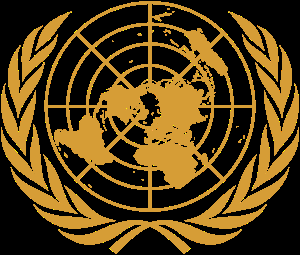
The UN emblem
Syria. The civil war. An issue which has become impossible to ignore as much of the world prepares to commit acts of warfare to remove the regime which is thought to have “crossed the red line” of attacking its own civilians with chemical weaponry. The ethical calculations required to decide on intervention do not lead to an indisputable answer. It would seem that the British and American public, whose governments are prepared to bypass the United Nations to intervene in Syria, clearly do not support the proposed air strikes. They’ve seen what has happened in Afghanistan and Iraq, and aren’t supportive of our interfering in the affairs of another distant country.
At present, nobody is suggesting that Western soldiers take part in actual combat. The allied forces currently wish to fire missiles directly at military bases operated by the Assad regime. Nevertheless, the anti-war lobby are saying that the West’s proposed response to the brutal slaughter of Syrians is the bombing of Syrians by our planes. I could talk all day about the issue of “collateral damage”, but that’s not what I want to discuss today.
David Cameron agreed to recall Parliament yesterday to secure a motion supporting British attacks on the Assad government- disturbingly, the British Prime Minister has the power to take the country to war without consulting Parliament, but he/she will generally respect Parliament’s wishes if given. However, the Whips go into overdrive to see that votes work to the benefit of party leaders. In my view, the only voice MPs should be listening to when deciding how to vote in an act of war is the collective one of their constituents. Warfare should always be above party politics.
Anyway, David Cameron was forced to backtrack when Ed Miliband announced Labour’s line on Syria: they would reject any intervention that took place before the UN weapons inspectors have reported (and presented ‘compelling evidence’ that international law had been breached) and the UN itself has voted on intervention. Labour would table an amendment to the parliamentary motion saying this. Let’s wait for the facts before we attack. Such a policy, which I personally endorse, received enough support from Lib Dem and SNP MPs that it seemed possible that the Government would be defeated. The the Leader of the Opposition would utilise public and parliamentary support to overrule the Prime Minister on the highest level issue that there could possibly be.
Say what you like about Ed Miliband, but he’s good in a crisis.
The PM promptly shied away from such a parliamentary confrontation, and within hours presented a new Motion to Parliament, which offers agreement in principle to a “strong humanitarian response” but delays a final vote on military action. A couple of hours ago Labour rejected that motion too, saying that they would vote against it unless their amendment was carried in full. The next few hours are going to be suspenseful ones in British politics.
The international community simply cannot permit any power to deploy chemical or biological weapons under any circumstances. If we don’t clamp down- sharply so- on such war crimes then we put millions at risk from their use in future conflicts. However, we need rock solid evidence that such a war crime has been permitted before we send in the warships.
I leave you with one final thought, which was put to me when discussing Syria on Twitter yesterday: why is the UK and US so outraged at chemical weaponry when between our nations we control enough nuclear warheads to incinerate half the planet?

